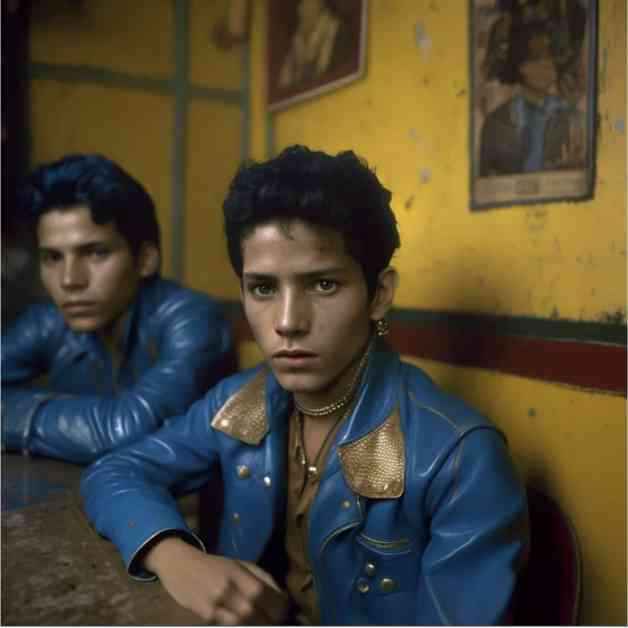In a groundbreaking move, the Getty Museum has recently made waves in the art world by acquiring its first-ever artificial intelligence-generated photograph. This innovative piece, titled Cristian en el Amor de Calle (2024), comes from the creative mind of queer Costa Rican photographer Matías Sauter Morera. The photograph features two young Latino men donning blue leather jackets adorned with gold embellishments, captured in what appears to be a bar or café setting. A striking element of the piece is the intense gaze of the central figure, drawing viewers into a narrative that speaks volumes about the queer history of pegamachos, or cowboys from the Guanacaste Coast, known for their clandestine relationships with young gay men.
Morera’s decision to utilize artificial intelligence in creating this work was not merely an artistic choice but a method of safeguarding the anonymity of the individuals portrayed. The pegamachos’ covert lifestyles necessitated discretion to ensure their safety—an aspect Morera masterfully navigated by leveraging AI technology to construct the photograph without revealing the real identities of his subjects.
Artistic Innovation and Ethical Boundaries
In a recent interview with Artnet News, Morera shed light on his creative process and the ethical considerations that influenced his decision to incorporate AI into his work. He explained, “AI provided a way also to achieve this without intruding on real lives or placing real Costa Rican faces that people of the community might recognize.” By using AI-generated images, Morera was able to pay homage to the pegamachos culture while preserving the secrecy that has shrouded it for generations. The resulting photographs serve as a testament to the power of artistic imagination and the ability to weave together narratives that transcend reality.
To bring Cristian en el Amor de Calle to life, Morera harnessed the capabilities of multiple AI models within Adobe Photoshop, allowing him to seamlessly integrate his pegamacho subjects into imagined scenarios without the need for extensive censorship. This fusion of technology and creativity enabled Morera to explore themes of identity, secrecy, and queer history in a visually compelling and thought-provoking manner.
Artificial Intelligence in the Art World
The acquisition of Morera’s AI-generated photograph by the Getty Museum marks a significant milestone in the ongoing dialogue surrounding artificial intelligence and its impact on the art world. Paul Martineau, the museum’s photography curator, views Cristian en el Amor de Calle as a testament to the evolving nature of photography, emphasizing that it is not merely a product of AI but a powerful work of art in its own right. The intersection of technology and creativity in Morera’s piece challenges traditional notions of authorship and raises questions about the role of AI in shaping the future of artistic expression.
The contentious nature of AI in art has been a topic of debate among artists and critics alike. Recent events, such as the open letter calling for the cancellation of Christie’s AI art sale, have sparked discussions about the ethical implications of using AI models to create art. While some view AI as a tool that enhances human creativity, others argue that it commodifies and exploits the very essence of artistic expression.
In the coming months, art enthusiasts will have the opportunity to experience Morera’s work firsthand at the Craig Kroll Gallery, where his solo exhibition “Pegamachos” will be on display from March 22 to May 3, 2025. Additionally, the Getty Museum will feature Cristian en el Amor de Calle in the group exhibition “The Queer Lens: A History of Photography,” curated by Paul Martineau, from June 17 to September 28, 2025. These exhibitions offer a unique opportunity to engage with Morera’s AI-generated photograph and explore the intersection of art, technology, and identity in a thought-provoking and visually captivating manner.












